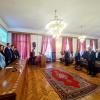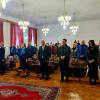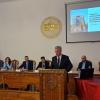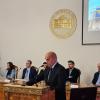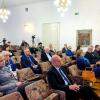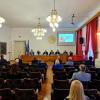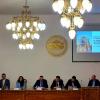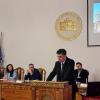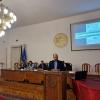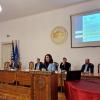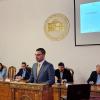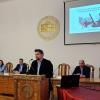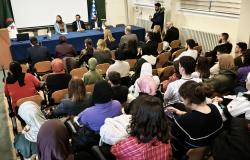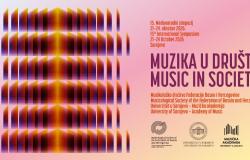University of Sarajevo organized a scientific panel at the on the occasion of 1 March - the Independence Day of Bosnia and Herzegovina
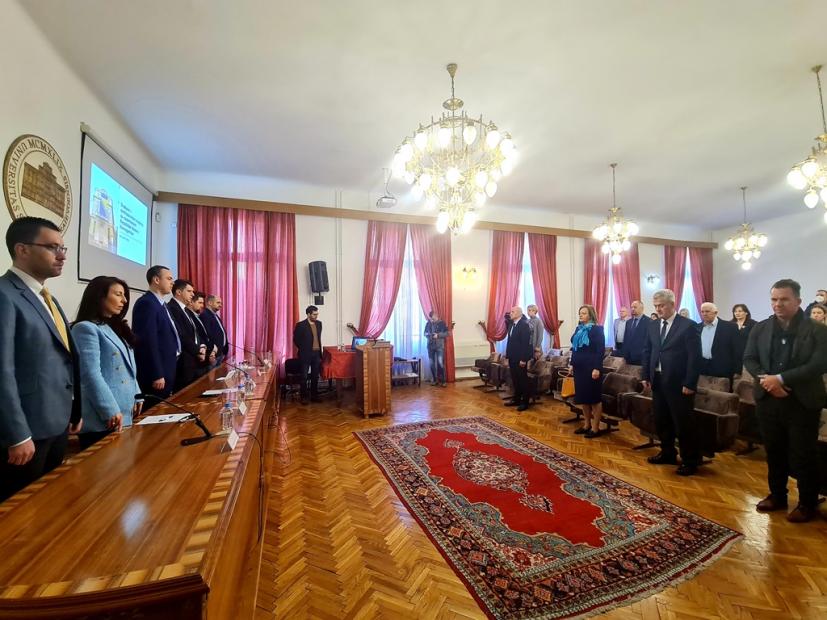
On the occasion of 1 March - Independence Day of Bosnia and Herzegovina - University of Sarajevo, Institute of History and Institute for Research of Crimes against Humanity and International Law, organized a scientific panel “Domestic and International Reactions to the Independence of the Republic of Bosnia and Herzegovina” held at the University of Sarajevo Rectorate.
This solemn and scientific gathering was opened with a welcome address by University of Sarajevo Rector, Prof. Dr. Rifat Škrijelj emphasizing that Bosnia and Herzegovina was a stable, independent and free state, and that 1 M1992 was a day of pride and determination, a day when Bosnians of all nationalities decided in a referendum for a sovereign, independent and sovereign Bosnia. and Herzegovina, a state of equal peoples and citizens.
"Today, 30 years later, it turned out that the path to independence was the only right solution in the moments of the dissolution of Yugoslavia. In addition to the brutal aggression and the imposed war, we managed to preserve the multiethnic code of this country. Therefore, let us be proud of the achievements of our Bosnia and Herzegovina, whose inner strength in its thousand-year tradition has always managed to overcome all adversity. I think it is very important that from a scientific point of view we constantly reconsider this important event that will be remembered in history as the day when Bosnia and Herzegovina renewed its sovereignty and became an independent state, "said Rector Škrijelj.
Institute for Research of Crimes against Humanity and International Law UNSA Director, Prof. Dr. Rasim Muratović emphasized that 25 November - BiH Statehood Day and 1 March - BiH Independence Day are the two most important dates in the modern history of Bosnia and Herzegovina.
“1 March 1992 was preceded by turbulent times of disintegration of Yugoslavia. Bosnia and Herzegovina, ie its state and political leadership in the talks held in 1990 and 1991, proposed the democratization of Yugoslavia, proposed the Alliance of Independent States. it took place in Greater Serbia and Greater Croatia projects, so that BiH had no choice but to move on the path of its independence” reminded director Muratović. The referendum was organized on 29 February and 1 March 1992. “It is interesting to say that the first country to recognize Bosnia and Herzegovina was Bulgaria. It did so even before the referendum was held on 30 January 1992. Also, before the referendum, Bosnia and Herzegovina was recognized by Turkey and Slovakia. After the referendum and announcement of results, the first country to recognize Bosnia and Herzegovina was Spain, followed by Libya and Iran, and all EU countries, including the United Kingdom and the United States, recognized Bosnia and Herzegovina as of 6, 7 and 8 April as an independent and sovereign state” pointed out director Muratović. As he said, today, out of 192 members of the United Nations, 182 countries recognize Bosnia and Herzegovina.
Institute of History of the University of Sarajevo director, Dr. Sedad Bešlija said that the goal of this event, as every year, was to remind ourselves of one of the most important, if not the most important, date in the recent history of Bosnia and Herzegovina. “And to remind the scientific, professional and general public once again of the value of state independence and the value of the existence of BiH institutions. To remind the public once again that values such as independence and freedom of one community are not given as a gift. society, we work every day to strengthen state institutions “ explained Dr. Bešlija.
As he stated, 30 years after the referendum, although it has made some progress, Bosnia and Herzegovina still faces fundamental issues such as the essential recognition of the independence of Bosnia and Herzegovina, the loyalty of all its citizens towards BiH. state institutions. "Bosnia and Herzegovina will continue to have this type of problem in the coming years. Therefore, the fundamental problem of how it will be further organized both within itself and in international law," added Dr. Bešlija.
On the occasion of the 30th anniversary of the Republic of Bosnia and Herzegovina’s independence, the panelists presented their research results, placing special emphasis on the political situation in the world and Bosnia and Herzegovina that led to the declaration of independence. What was the position of the official US policy, whether the EU members had a unified position on the issue of the disintegration of Yugoslavia and how domestic political factors approached the issue of independence, were the topics of today's panel. This was an opportunity to discuss, on the basis of scientifically relevant data, the historical context of one of the most significant events in the overall past of Bosnia and Herzegovina.
Through five papers, the focus was on domestic and international reactions to the independence of Bosnia and Herzegovina:
Dr. Jasmin Medić (Institute of History, University of Sarajevo) – “Relationship among European Community members on the independence of Bosnia and Herzegovina”;
Prof. Dr. Hamza Karčić (Faculty of Political Science, University of Sarajevo) – “American Reactions to the Independence of Bosnia and Herzegovina”;
Dr. Zilha Mastalić-Košuta (Institute for Research of Crimes against Humanity and International Law, University of Sarajevo) – “The Role of the Croatian Political Body in the Referendum for the Independence of Bosnia and Herzegovina”;
Dr. Muamer Džananović (Institute for Research of Crimes against Humanity and International Law, University of Sarajevo) – “Activities of the Serb Democratic Party (SDS) on the announced independence of Bosnia and Herzegovina”;
Dr. Hikmet Karčić (Institute for the Islamic Tradition of Bosniaks) – “Barricades: Violent Reaction of the Serb Democratic Party (SDS) to the Declaration of Independence of Bosnia and Herzegovina.”
The panel ended with the following message:
Regardless of the different actions of the citizens and peoples representatives during the dissolution of the SFRY and the process of gaining independence of BiH, regardless of all long-standing and still current differences and attitudes towards the state of Bosnia and Herzegovina, it is very important that all citizens of Bosnia and Herzegovina have a Bosnian passport. that they are perceived as Bosnians outside Bosnia and Herzegovina, that they have an independent and self-sufficient home - and it is up to each individual how and whether they will build or demolish their house.
In the extremely turbulent times we are in, when a new world order is probably being formed, when many other nations, communities, individuals are wandering the world without basic identification documents and without protection of their own state because many of them do not have a state, peoples in Bosnia and Herzegovina, the citizens of Bosnia and Herzegovina, the Bosnian nation, has the privilege of having its own independent state.
That is why it is important to further develop and enrich the content of acquired state independence and sovereignty - in political, diplomatic, economic, educational, cultural and every other segment, for the benefit of all inhabitants of Bosnia and Herzegovina and future generations.




